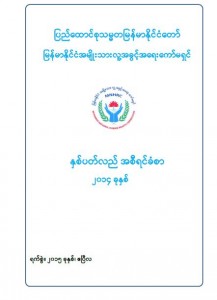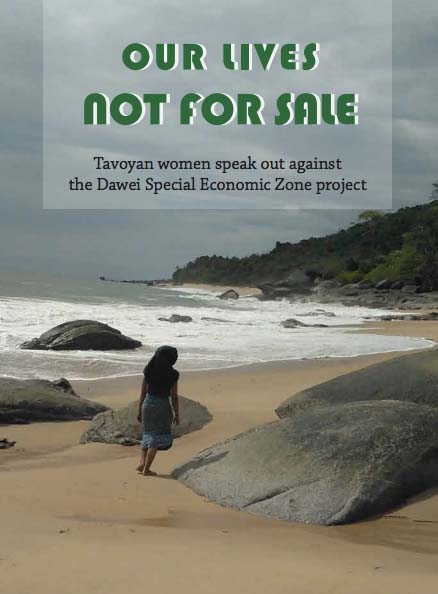Economy (107 found)
ျမန္မာႏိုင္ငံအမ်ိဳးသားလူ႔အခြင့္အေရးေကာ္မရွင္: ႏွစ္ပတ္လည္ အစီရင္ခံစာ ( ၂၀၁၄)
ျပည္ေထာင္စုသမၼတ ျမန္မာႏိုင္ငံေတာ္၊ ျပည္ေထာင္စု အစုိးရအဖဲြ႔သည္ ဖဲြ႔စည္းပုံအေျခခံဥပေဒပါ ႏိုင္ငံသားမ်ား၏ မူလအခြင့္အေရးမ်ားကို ျမွင့္တင္ေရးႏွင့္ ကာကြယ္ေစာင့္ေရွာက္ေရးတုိ႔အား ေဆာင္ရြက္ႏုိင္ရန္အလုိ႔ငွာ ၂၀၁၁ခုႏွစ္၊ စက္တင္ဘာလ (၅) ရက္ေန႔တြင္ အမိန္႔ေၾကာ္ျငာစာ အမွတ္ ( ၃၄/၂၀၁၁) ျဖင့္ ျမန္မာႏိုင္ငံ အမ်ိဳးသား လူ႔အခြင့္အေရး ေကာ္မရွင္ကုိ အဖြဲ႔၀င္ ( ၁၅) ဦးျဖင့္ ဖဲြ႔စည္းျပီး တာ၀န္ႏွင့္လုပ္ပုိင္ခြင့္မ်ား သတ္မွတ္ထုတ္ျပန္ခဲ့ပါသည္ […]
၂၀၁၁ခုႏွစ္၊ စက္တင္ဘာလ (၅) ရက္ေန႔တြင္ အမိန္႔ေၾကာ္ျငာစာ အမွတ္ ( ၃၄/၂၀၁၁) ျဖင့္ ျမန္မာႏိုင္ငံ အမ်ိဳးသား လူ႔အခြင့္အေရး ေကာ္မရွင္ကုိ အဖြဲ႔၀င္ ( ၁၅) ဦးျဖင့္ ဖဲြ႔စည္းျပီး တာ၀န္ႏွင့္လုပ္ပုိင္ခြင့္မ်ား သတ္မွတ္ထုတ္ျပန္ခဲ့ပါသည္ […]
Statement by Ms Yanghee Lee, Special Rapporteur on the Situation of Human Rights in Myanmar at the 28th Session of the Human Rights Council
I thank you for this opportunity to address the Human Rights Council for the first time, at a pivotal time in the reform process in Myanmar.
• • •Karen Rivers Watch Statement on International Day of Rivers and Against Dam
On the International Day of Action for Rivers and Against Dams, Karen Rivers Watch renews its call for the suspension of all dam projects in Karen State and other ethnic states […]
• • •Advance Unedited Version: Report of the Special Rapporteur on the situation of human rights in Myanmar, Yanghee LEE
Since 2011, Myanmar has undergone far-reaching changes that have affected many aspects of life in the country. However, there continue to be signs of backtracking by the Government and increasing concerns over discrimination and ethnic conflict […]
• • •Amnesty International Annual Report – Myanmar Chapter
Despite ongoing political, legal and economic reforms, progress on human rights stalled, with some backward steps in key areas. The situation of the Rohingya deteriorated, with ongoing discrimination in law and practice exacerbated by a dire humanitarian situation. Anti-Muslim violence persisted, with the authorities failing to hold suspected perpetrators to account. Reports of abuses of international human rights and humanitarian law in areas of armed conflict persisted. Freedoms of expression and peaceful assembly remained severely restricted, with scores of human rights defenders, journalists and political activists arrested and imprisoned. Impunity persisted for past crimes […]
• • •Myanmar: Open for Business? Corporate Crime and Abuses at Myanmar Copper Mine
 This report focuses on the Monywa copper mine project and highlights forced evictions, substantial environmental and social impacts, and the repression, sometimes brutal, of those who try to protest. It also raises serious questions about opaque corporate dealings and possible infringements of economic sanctions on Myanmar.
This report focuses on the Monywa copper mine project and highlights forced evictions, substantial environmental and social impacts, and the repression, sometimes brutal, of those who try to protest. It also raises serious questions about opaque corporate dealings and possible infringements of economic sanctions on Myanmar.
WORLD REPORT 2015
Burma
The reform process in Burma experienced significant slowdowns and in some cases reversals of basic freedoms and democratic progress in 2014. The government continued to pass laws with significant human rights limitations, failed to address calls for constitutional reform ahead of the 2015 elections, and increased arrests of peaceful critics, including land protesters and journalists […]
• • •Statement from the Open Government Partnership Awareness Workshop for Civil Society
Over 193 representatives from 80 Civil Society Organizations (CSOs) and networks in Myanmar participated in the Open Government Partnership (OGP) awareness-raising workshop in Yangon from 19-20 January 2015. The objective of this workshop was to raise awareness and understand the potential benefits, opportunities, weaknesses and concerns regarding Myanmar’s participation in the OGP in the context of the recent transition process and the political developments in Myanmar since 2011 […]
• • •Our Lives Not For Sale: Tavoyan Women Speak Out Against the Dawei Special Economic Zone Project
 This report exposes the damaging impacts of the Dawei Special Economic Zone (DSEZ) project on rural Tavoyan women living in six affected villages in southern Burma. Most of the local population are fisherfolk and farmers, who have lived sustainably for generations in this isolated coastal area. They have been given no choice about accepting this multi-billion dollor Thailand-Burma joint venture, which will turn their pristine lands into the largest petrochemical estate in Southeast Asia […]
This report exposes the damaging impacts of the Dawei Special Economic Zone (DSEZ) project on rural Tavoyan women living in six affected villages in southern Burma. Most of the local population are fisherfolk and farmers, who have lived sustainably for generations in this isolated coastal area. They have been given no choice about accepting this multi-billion dollor Thailand-Burma joint venture, which will turn their pristine lands into the largest petrochemical estate in Southeast Asia […]
Myanmar 2014: Civic Knowledge and Values in a Changing Society
 After decades of military rule and isolation, a new Asia Foundation survey shows Myanmar’s citizens are hopeful about the future – on elections, respondents say they believe in exercising their right to vote: 77 percent say that voting can lead to improvements in the future, just 10 percent say things will not change no matter how one votes. But this optimism is tempered by challenges that remain. The findings reveal limited knowledge among the public about government institutions and their functions, low level of social trust, a high degree of political polarization, and deep apprehension about economic opportunities.
After decades of military rule and isolation, a new Asia Foundation survey shows Myanmar’s citizens are hopeful about the future – on elections, respondents say they believe in exercising their right to vote: 77 percent say that voting can lead to improvements in the future, just 10 percent say things will not change no matter how one votes. But this optimism is tempered by challenges that remain. The findings reveal limited knowledge among the public about government institutions and their functions, low level of social trust, a high degree of political polarization, and deep apprehension about economic opportunities.

 All posts
All posts